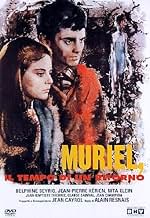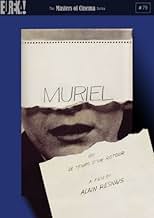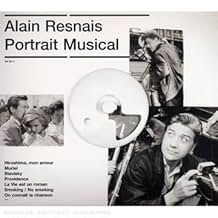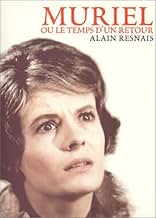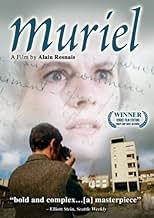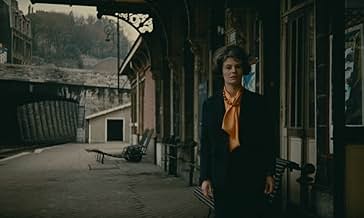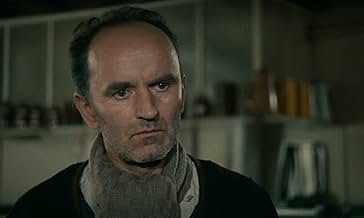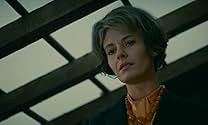Muriel ou le temps d'un retour
- 1963
- Tous publics
- 1h 57m
IMDb RATING
7.0/10
4K
YOUR RATING
In the seaside town of Boulogne, no one seems to be able to cope with their past, least of all Hélène, an antique furniture saleswoman, her stepson Bernard, and her former lover Alphonse.In the seaside town of Boulogne, no one seems to be able to cope with their past, least of all Hélène, an antique furniture saleswoman, her stepson Bernard, and her former lover Alphonse.In the seaside town of Boulogne, no one seems to be able to cope with their past, least of all Hélène, an antique furniture saleswoman, her stepson Bernard, and her former lover Alphonse.
- Awards
- 3 wins & 3 nominations total
Jean-Baptiste Thiérrée
- Bernard Aughain
- (as Jean-Baptiste Thierrée)
Wanda Kerien
- La cliente
- (as Wanda Kérien)
- Director
- Writer
- All cast & crew
- Production, box office & more at IMDbPro
Featured reviews
not for the casual DVD renter. Muriel is *not* entertainment but a film that demands that we endure its theatricality and embalmed atmosphere in order to reflect, along with Resnais, about various kinds of unbearable pasts, personal and national. The city of Boulogne is itself a character in Muriel, rebuilt and unrecognizable after the bombings of World War II...Helene (Delphine Seyrig) is an antique dealer whose home is her gallery--so she lives in a jumble of distant French pasts all the better to avoid her own. The "home movie" sequence is one of the few in French cinema of the 60s where the Algerian War is figured--but here, we see happy soldiers hanging out, images to send home (and to French TV), while the voice-over (Helene's stepson) recounts the rape and torture of the Algerian woman named in the title. Daring, in light of French censorship of any text that compromised state security during the "Algerian situation." Muriel will leave you with more questions than resolutions.
10Aw-komon
The first time I saw 'Muriel' (it was, for years, extremely hard to find on video and only one video store carried it even in movie mecca L.A.) I was completely confounded by it. The radical presentation of the ordinary characters in the context of their transcendent thoughts and memories seemed to be uninteresting and bland, precisely because I hadn't thought of its connections to the universal. I didn't think it warranted any closer attention. But I knew there was something there I was uncomfortable with, I knew I had to come back to this film sometime and reassess it.
Needless to say, I am glad I made that reassessment because this is such an amazingly satisfying film, once all the pieces of the puzzle come togeher in your head in their subtle details. It is nearly flawless in conception and execution and has to be one of the supreme works of art this century. It works on more levels than any other film I can think of, even 'Pierrot Le Fou' and '8-1/2.' The difference is, almost all of it is hidden at first sight. You definitely have to pay UNDIVIDED ATTENTION and CONCENTRATE to start with, especially if you're reading the subtitles in English. Every word is there for a purpose and every shot counts. I'd suggest that you watch it (thank god it is now available on video and at such a reasonable price)at the bare minimum 3 times before you even presume to make a judgment. Here are only a few of the things I like about 'Muriel:' It is a thriller with many comic elements that ultimately becomes a sublime tragedy of modern existence. It has superb 'realism' in acting to beautifully contrast with what it's really about: the transcendent aspects of life such as memory and the way it and they (the other aspects) affect the present. The beautiful faded-tone, color photography is psychologically calculated (a definite influence on 'Red Desert') for effect and just indescribably poetic. The virtuoso, quick cutting in the middle section is completely chronological in nature but elegantly provides multiple perspectives without distorting things with unnecessary length (since all these things are going on pretty much at the same time).
I cannot recommend this film highly enough for anyone interested in great cinema.
Needless to say, I am glad I made that reassessment because this is such an amazingly satisfying film, once all the pieces of the puzzle come togeher in your head in their subtle details. It is nearly flawless in conception and execution and has to be one of the supreme works of art this century. It works on more levels than any other film I can think of, even 'Pierrot Le Fou' and '8-1/2.' The difference is, almost all of it is hidden at first sight. You definitely have to pay UNDIVIDED ATTENTION and CONCENTRATE to start with, especially if you're reading the subtitles in English. Every word is there for a purpose and every shot counts. I'd suggest that you watch it (thank god it is now available on video and at such a reasonable price)at the bare minimum 3 times before you even presume to make a judgment. Here are only a few of the things I like about 'Muriel:' It is a thriller with many comic elements that ultimately becomes a sublime tragedy of modern existence. It has superb 'realism' in acting to beautifully contrast with what it's really about: the transcendent aspects of life such as memory and the way it and they (the other aspects) affect the present. The beautiful faded-tone, color photography is psychologically calculated (a definite influence on 'Red Desert') for effect and just indescribably poetic. The virtuoso, quick cutting in the middle section is completely chronological in nature but elegantly provides multiple perspectives without distorting things with unnecessary length (since all these things are going on pretty much at the same time).
I cannot recommend this film highly enough for anyone interested in great cinema.
Resnais is one of the seven sages of cinema, perhaps even one of the most important ones. Within him we find others, like Godard and Marker, who inherited the problems he first posited with clarity of vision and eloquence of mood. Problems of memory, firstly how the past forms manifest in consciousness and synthesize an illusionary space which we then inhabit (in itself a poignant inspection of the mechanisms of cinema), more importantly what these past forms are, which we understand as the self and identity, and how they trap us in meaningless dilemmas.
His astounding contribution to this field, is in how he brilliantly envisions this space by means of a visual vocabulary and how he articulates within it. The museum in Hiroshima (which reappears here again, as homage), the hotel in Marienbad.
We find the wandering of memory again in Muriel, in a form a tad less inspired this time than those films.
Passions past and present, which defined the participants as persons and left indelible marks on their souls, we see how they appear again after time. We see these people use memory as the only means of reliving time, of painfully trying to claim again the ethical vindication that escaped them the first time. How this past, projected in their minds, appears again around them to trap them anew. And we see how, their lives stifled as a result of those past anxieties, the memory of these things points at no way out.
The characters in this are fittingly restless, always rushing particularly nowhere, actually running from things they won't admit. Running perhaps against all hope that they will face them again. Moments of reflection are burdened with half-remembered sadness, while life outside continues indifferently.
Entire scenes of this play out as they would in ordinary melodrama, then the narrative seems to break down for a time. Virtually recalling fragments of images and conversations which mean nothing, we become privy to the destructive powers of memory. We actually experience the disorientation as part of the movie.
But Muriel lacks something in comparison to those other films. Perhaps it's the political angle (re the Algiers conflict and how it resonates in a complacent French bourgeois society), which in previous Resnais films is quietly buried underneath, dormant and supine, yet here greets us upfront, often violently demanding our discourse. Perhaps it's the pastel color palette, that may had been intented to invoke the contours of melodrama whose tropes the movie rearranges, but renders the film now a relic of the times.
Nonetheless Resnais here gives us an important realization. How we spend the present moment reliving past sufferings or anticipating the future with fear or hope, allowing these chimeras of the mind, born of desire, to cloud our soul, to disrupt our contact with the world. He gives us this not as a grave speech, something Bergman would do who was impotent in the face of suffering, but in the form of a merry jingle, which one character playfully recites after a dinner gathering, as a way of reminding us how trivial and unimportant these past or future fears are.
His astounding contribution to this field, is in how he brilliantly envisions this space by means of a visual vocabulary and how he articulates within it. The museum in Hiroshima (which reappears here again, as homage), the hotel in Marienbad.
We find the wandering of memory again in Muriel, in a form a tad less inspired this time than those films.
Passions past and present, which defined the participants as persons and left indelible marks on their souls, we see how they appear again after time. We see these people use memory as the only means of reliving time, of painfully trying to claim again the ethical vindication that escaped them the first time. How this past, projected in their minds, appears again around them to trap them anew. And we see how, their lives stifled as a result of those past anxieties, the memory of these things points at no way out.
The characters in this are fittingly restless, always rushing particularly nowhere, actually running from things they won't admit. Running perhaps against all hope that they will face them again. Moments of reflection are burdened with half-remembered sadness, while life outside continues indifferently.
Entire scenes of this play out as they would in ordinary melodrama, then the narrative seems to break down for a time. Virtually recalling fragments of images and conversations which mean nothing, we become privy to the destructive powers of memory. We actually experience the disorientation as part of the movie.
But Muriel lacks something in comparison to those other films. Perhaps it's the political angle (re the Algiers conflict and how it resonates in a complacent French bourgeois society), which in previous Resnais films is quietly buried underneath, dormant and supine, yet here greets us upfront, often violently demanding our discourse. Perhaps it's the pastel color palette, that may had been intented to invoke the contours of melodrama whose tropes the movie rearranges, but renders the film now a relic of the times.
Nonetheless Resnais here gives us an important realization. How we spend the present moment reliving past sufferings or anticipating the future with fear or hope, allowing these chimeras of the mind, born of desire, to cloud our soul, to disrupt our contact with the world. He gives us this not as a grave speech, something Bergman would do who was impotent in the face of suffering, but in the form of a merry jingle, which one character playfully recites after a dinner gathering, as a way of reminding us how trivial and unimportant these past or future fears are.
I had never seen an Alain Resnais movie before. Despite the fact most of my IMDb friends had told me to start off with Hiroshima Mon Amour, I was more drawn to Muriel and chose it as my first taste of Resnais. In a nutshell: it was far more interesting thematically and cinematographically (also on a purely technical level) than it was enjoyable. I'm still very glad that I saw it, though. The most fascinating aspect of it was without doubt the montage, or editing. Rather than directing or acting, or even the screen writing, it was the editing that had the lion's share of the movie, as if it were its star. I cannot think of another movie where this is quite as apparent. Some of Muriel's style of editing felt like machine-gun-fire, being so relentlessly fast and aggressive in parts, but it was in my opinion very powerful and efficient in leaving an impression of "mental flashes". This emulated the nature of memory, which is the theme at the heart of an otherwise grim and pessimistic movie. Yet this darkness is masked by an appearance of everyday banality in a provincial town, making it all the more depressing, since it's easier to relate the melancholy at its core to one's own, everyday existence. Not for nothing, the movie was also set in winter, and nothing is quite as melancholy and nostalgic as a sea-side town off-season.
The last 10 minutes of the movie, more or less from the "revelation" at Hélène's Sunday lunch right to the moments in which the word "Fin" (The End) appeared on the screen, were the most powerful bout of cinematic caffeine I've experienced in a while. Until that moment I was starting to worry that the film was going nowhere too specific, or at least not somewhere that I understood or knew. Then came the final emotional earthquake, redeeming the movie tenfold, and I was virtually just as shocked as most of the characters in it.
OK, I'll admit I wasn't overly enamoured of the acting. With the exception of Delphine Seyrig playing Hélène, who succeeded in convincing me with her interpretation of the character as well as making me feel sympathetic towards her, the other players left me virtually cold. For a while I thought I'd like Nita Klein playing Françoise, then I started thinking that her character was pretty much redundant and should have been far more marginal than it actually was (and what was going on between her and Bernard anyway? That felt like a contrivance). Since I mentioned Bernard, played by Jean-Baptiste Thierrée, let me say that he was the character I was least convinced by. Quite frankly, I wasn't partial to the way the actor chose to bring him to life at all. Yet he and his drama - the traumas he'd experienced during the Algerian war, his witnessing the torture of an Algerian girl, the titular Muriel, which scarred him for life - was probably the heart and kernel of the movie! Jean-Pierre Kérien playing Alphonse, is the player that most viewers here seem to criticise. In my view there wasn't much else he could have done with the character, seeing as he was mostly a pretext for Hélène's tragedy. But in the last ten minutes of the movie Alphonse's raison d'être comes sharply to the forefront, thanks to the shocking revelation previously mentioned. It was Bernard that I expected more from acting-wise, I guess. Furthermore, the soundtrack was occasionally strident and annoying, perhaps trying to be an aural version of the editing. But while it worked on a visual level, the music's jarred quality was ultimately grating.
However, for the courage with which the movie tackled subjects which are best rendered in a novel form, for its successfully experimental editing, as well as its genuinely moving ending, I'll still award Muriel a pretty high score: 7.5/10 (it would have been 8 if the acting, not just from Seyrig, had been more accomplished).
The last 10 minutes of the movie, more or less from the "revelation" at Hélène's Sunday lunch right to the moments in which the word "Fin" (The End) appeared on the screen, were the most powerful bout of cinematic caffeine I've experienced in a while. Until that moment I was starting to worry that the film was going nowhere too specific, or at least not somewhere that I understood or knew. Then came the final emotional earthquake, redeeming the movie tenfold, and I was virtually just as shocked as most of the characters in it.
OK, I'll admit I wasn't overly enamoured of the acting. With the exception of Delphine Seyrig playing Hélène, who succeeded in convincing me with her interpretation of the character as well as making me feel sympathetic towards her, the other players left me virtually cold. For a while I thought I'd like Nita Klein playing Françoise, then I started thinking that her character was pretty much redundant and should have been far more marginal than it actually was (and what was going on between her and Bernard anyway? That felt like a contrivance). Since I mentioned Bernard, played by Jean-Baptiste Thierrée, let me say that he was the character I was least convinced by. Quite frankly, I wasn't partial to the way the actor chose to bring him to life at all. Yet he and his drama - the traumas he'd experienced during the Algerian war, his witnessing the torture of an Algerian girl, the titular Muriel, which scarred him for life - was probably the heart and kernel of the movie! Jean-Pierre Kérien playing Alphonse, is the player that most viewers here seem to criticise. In my view there wasn't much else he could have done with the character, seeing as he was mostly a pretext for Hélène's tragedy. But in the last ten minutes of the movie Alphonse's raison d'être comes sharply to the forefront, thanks to the shocking revelation previously mentioned. It was Bernard that I expected more from acting-wise, I guess. Furthermore, the soundtrack was occasionally strident and annoying, perhaps trying to be an aural version of the editing. But while it worked on a visual level, the music's jarred quality was ultimately grating.
However, for the courage with which the movie tackled subjects which are best rendered in a novel form, for its successfully experimental editing, as well as its genuinely moving ending, I'll still award Muriel a pretty high score: 7.5/10 (it would have been 8 if the acting, not just from Seyrig, had been more accomplished).
Some decades before Haneke's 'Cache' once more centralised the trope of Algeria-guilt amongst the bourgeoisie, 'Muriel' is less a polemical allegory-and less marked by immigrant experience-and more a kind of spider's web of implication, its critique of French conduct in Algeria constructed as a kind of puzzle which is only really a puzzle if we ignore those political truths hiding in plain sight-which is precisely the point. Haneke is concerned to reveal his cards half-way through the film-it's important that one *get* and *absorb* a message. Likewise, in Muriel, the account of torture committed by the ex-soldier now returned to Boulogne-sur-Mer plays out at the half-way point. But for Resnais and scriptwriter Jean Cayrol, to whom the film equally owes its striking detail and shape, form and message are imbricated in closer ways. Likewise, compared to other experiments with narrative within avant-garde cinema of the period-including Resnais' own-here, complexities of perception rendered through avant-garde technique may reflect existential questions of memory, desire and so on, but more precisely, they serve a political purpose. As in Demy's Parapluies de Cherbourg the following year, the film's critique of French conduct in Algeria is presented as both motor to and peripheral figure / irritant within what is in some ways a love story. But there are no Michel Legrand songs here, no bright-burning neon glow, no dwelling in sentiment: the film is analytical, critical, clipped, dense. The constructs of desire, loss, the attempt to regain past intimacy, told in half-finished stories, never-received letters, interrupted monologues, the constant unspoken-the evasions and illusions of romantic love-are open secrets around which the lovers tip-toe, traipse and on which they trample, while the Algerian conflict is imbricated within the social fabric of a particular town, and, metonymically, the broader society in which it has its place. Of particular interest for the film is the way that the community of that town is constructed through a mixture of the repressed memory of trauma (the second world war and national service in Algeria-attack by or complicity with fascist occupation domestically and participation in colonial violence abroad), the militarist underlay of the business world, of Gaullism, of particular modes of masculine identity. The clipped precision of the film's extreme fast-cutting turns editing at once almost hallucinatory in its flashes of distorted logic and extraordinarily precise in its planned juxtapositions: the trope of mystery-who is Muriel? What happened in Algeria? What happened to break apart the now elderly lovers reunited in a web of half-truths, half-desires, and deceit?-a diagnostic frame at once personal and social. Resnais may suggest that film itself-at least, as conceived of as a repository of direct truth, the authenticity of visual experience-is inadequate: as when the young ex-soldiers' Algerian footage literally burns up in the projector when exposed to the light. But film, understood differently-for its challenge to, its going against the grain of perception-provides the shock to the habituated dailiness of looking so that an antique table, the door to a café, a walk around town, the assassination of a far-right terrorist, flicker and bunch up together like a terrible revelation of what lies beneath.
Did you know
- TriviaAt a press conference at the Venice Film Festival in 1963, Alain Resnais said that his film depicted "the malaise of a so-called happy society. ...A new world is taking shape, my characters are afraid of it, and they don't know how to face up to it."
- ConnectionsFeatured in Whiplash (2014)
- How long is Muriel?Powered by Alexa
Details
- Runtime1 hour 57 minutes
- Sound mix
- Aspect ratio
- 1.66 : 1
Contribute to this page
Suggest an edit or add missing content

Top Gap
By what name was Muriel ou le temps d'un retour (1963) officially released in India in English?
Answer

